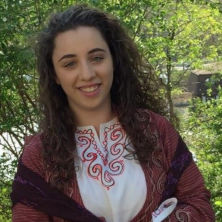What Great Minds Can Do: Kalliopi Logothetis
Kalliopi Logothetis
B.A., History/ M.A., History, Secondary Education majors; Women and Gender Studies minor
,

Could you describe your senior Honors research project on co-education?
My project focused on the coeducation movement in the 1960s at Seton Hall University,
paying particular attention to the changing attitudes during this decade. I examined
how women attending Seton Hall experienced those changes. To some extent, Seton Hall
was following a similar narrative of other Catholic and non-secular colleges and universities
in the 1960s. While the final decision for coeducation was implemented through a decision
by the Board of Trustees, this decision was based on various pressures of the time
including the need to alleviate financial burdens that were escalating yearly, and
social pressures from Seton Hall administration and faculty, who were urging the university
to change its policies on coeducation at the South Orange campus. My paper examines
these changing attitudes and how women at the extension schools and the initial cohort
of women on the main Seton Hall campus were able to enjoy all the benefits of being
part of the South Orange community in the revolutionary decade of the 1960s.
Could you describe your research process? What kinds of sources have you found the
most helpful?
I found that the most helpful resources could be located in Seton Hall's archives,
but I've also used the oral histories from past Seton Hall graduates. These have the
most insight about what was going on during the 1960s. Although relying on memories
of alumni cannot always be taken at face value, in many instances I have been able
to corroborate evidence with information I have found in the school’s newspaper, The
Setonian. I have also been able to find interesting evidence in documents from the
Office of the Dean of Women as well as the Dean of Men.
Is there something particularly interesting about your topic that you've found through
your research?
I think there are so many interesting areas in my research. It is evident that there
were different gender expectations and it could either work to their advantage or
disadvantage. For example, when the Dean of Women was urging the Board of Trustees
to recognize a constant threat of danger for women, she constructed her argument around
gender theories. I found this fascinating because gender was the main factor that
disallowed women from living on the main South Orange Campus in the first place.
What has been your favorite time period/subject of historical study throughout your
studies?
I have particularly enjoyed looking at U.S. History through the eyes of women. It
was in Professor May's "Women in American History" courses where I realized just how
little most people know about the progression of women's history in the U.S. and around
the world. Ever since that experience, I have been passionate about investigating
and developing my own understanding of the ways in which women negotiated the space
that they were often confined in based on the societal norms of the day.
What has been your favorite History course at Seton Hall so far, and why?
It is difficult to choose a favorite class because I have found something enjoyable
about all the classes I have taken. I generally enjoy courses where we're taught to
think critically about different moments in history. Professor May's "Women in the
U.S." course and Professor Giblin-Gedacht's "History of Traditional Japan" course
were definitely ones I have enjoyed the most here at Seton Hall. These classes drove
my curiosity about women and gender studies, and I've even been able to incorporate
my interest in that subject matter in other history classes. For example, Dr. Giblin-Gedacht's
course was not focused on women, but I was able to research and learn more about the
early Geisha, which was a topic that fascinated me.
Career Highlights:
- President, New Jersey Student Educator Association
- Vice President, Hellenic Student Organization
- Phi Alpha Theta History Honor Society
- Kappa Delta Pi International Honor Society in Education
- Teaching intern in Cranford, Newark and South Orange
- Intern, Morris Museum in Morris Township, New Jersey

